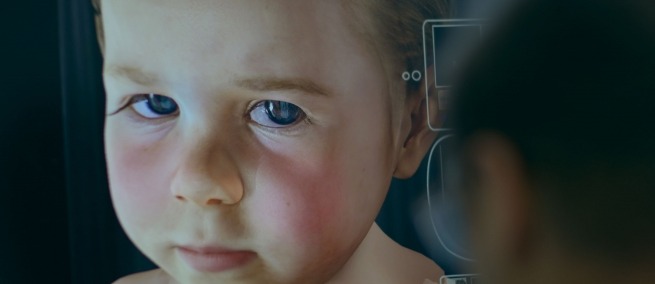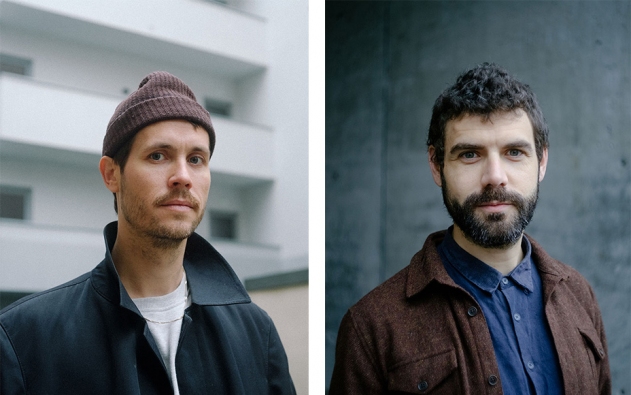
ETERNAL YOU, a documentary making its world premiere at the 2024 Sundance Film Festival in the World Documentary Competition, follows users of new AI-powered technology that allows them to interact with avatars of deceased loved ones. The film was made over the course of six years by German filmmakers Hans Block and Moritz Riesewieck (THE CLEANERS). We spoke with them from Sundance about their attitudes towards this new application of AI and their filmmaking approach.
Science & Film: What was your starting place with this story?
Moritz Riesewieck: In 2018, which was also the year of the premiere of our previous film, THE CLEANERS, we discovered a website stating: you can become virtually immortal. We were like, this sounds like a cheap scam, what's behind it? We became curious and we learned that the founder of this company was an MIT fellow, but we learned that his [statement] was back then kind of an empty promise. Researching this emerging technology that was using the data of the living to then make an avatar of them as soon as they have passed, he didn't manage to fulfill this promise. He had to disappoint, he said, like 30,000 people who were on the waitlist. We couldn't check that [number]. But a lot of people were in existential crisis moments: people who were severely ill and had to die soon themselves, or their loved ones were going to [die]. It shocked us that he was so easily playing with the feelings of people in such an existential crisis. We noticed that there were other startups out there, which started to appear with similar promises, and we followed them.
We were privileged to be there when they tried the first avatars and bots with their first clients, their guinea pigs so to speak, and sometimes it was very disturbing to see how much they fell for it, and other times, it didn't work at all. We continued meeting both the clients as well as the founders of these startups, and then as we all know, there was this massive development in artificial intelligence and in similar technologies like voice synthesis and visual cloning, and what formerly was an empty promise became more and more possible and convincing. We were really surprised at how far this went. Now we are at this moment where something which sounds like a BLACK MIRROR episode is finally reality, which is still stunning for us.
S&F: Do either of you see a connection between your previous film, THE CLEANERS, and ETERNAL YOU?
Hans Block: We are super interested in these technological topics. It's a challenge for us to make something which is invisible, visible. For example, artificial intelligence is very hard to capture. To translate that into a film, it’s an immense power. That's what we realized after we made THE CLEANERS, that some of the audience for the first time understood what the consequences of using social media are, for example. There are always humans behind every great technology, and we tried to capture that story. That was also the starting point and the goal for this film, to make something which is really hard to capture visible. Artificial intelligence is such a huge term. We tried to make something very abstract very concrete, so that we can talk about it and so that we can open a discussion about very concrete questions we need to discuss in society. We are so happy to be here [at Sundance] because we know the film will find a broader audience and we can open a big discussion.

Hans Block and Moritz Riesewieck. Photos by Konrad Waldmann, courtesy of Sundance Institute.
S&F: Can you speak a bit about your approach to your subjects?
MR: What's most important for us, in both films, is that we put the humans in the center of all. We don't want to make a film about an emerging technology. Our interest is to explore and understand better the impact of the technology on humans, on their psyche, on their behavior, on their belief system, and on their ideology. On the sides of the developers of this technology, what kind of ideology do they put into the programming, for example? At the very beginning of this research, a lot of people asked us, what's your opinion on all of this? And we always refused to give an answer to that, because that's crucial for our kind of working, that we don't want to take a position too early in the process—we want to remain curious and open.
In the beginning, when we thought about this idea, none of us wanted to have an avatar of himself after death. We didn't even want that for our loved ones. But then, the more we accompanied the first users of this, the more we learned that actually you can be in very existential crises and you can have situations when you deeply mourn somebody, when you have this one open question that you definitely wanted to ask somebody and you couldn't, you didn't have the chance to say goodbye to somebody, and this haunts you so much that you fall for this chance to have a simulated conversation. There is nothing against trying it out. But what makes this technology so impactful and dangerous is, the more you interact with it, the more questions appear, the more irritations appear, the more you are provoked to always want to continue this conversation. That can become addictive. It can cause people to leave their real social life behind and turn towards this simulated life on the other side, because the AI is really good. As Sherry Turkle puts it in our film: it's really good at tricking you into thinking that there's a there there on the other side. We were really surprised at how seductive, how deceptive this technology can be, no matter how intelligent you are. That was important for us to show in our film, to surprise the audience who comes with an opinion, and then change that opinion or at least let them question their very strong opinion.
HB: I was thinking about the similarities between our two films, and the more I think about it, the more similarities come up. For example, for ETERNAL YOU we managed to accompany the first users of this technology. Also, we were the first ones accompanying the content moderators working and filtering [in THE CLEANERS]. So in a way, we are super early into these developments capturing, so to say, a historical moment. Also, in the postproduction process there are so many similarities with THE CLEANERS and ETERNAL YOU. After we did THE CLEANERS, we said to each other, we will never again do a story was so many characters, with so many layers, it was so complicated in the editing room to bring all that together. And here we are, again. There are so many characters, different experts, the users, the makers, and to bring all that together—we had hundreds of hours of material in the editing room. It took us more than half a year with two editing teams. But you need to do that, you need to take that time in order to get to the essence of what the film is about.
S&F: Did you glean any other insights into why people might be drawn to the promise of these applications?
MR: There are a lack of rituals about death in our societies today—many hundreds of millions of people in Western societies have turned away from religion. There is a big void, and these tech companies know really well how to fill this void, and how to offer a kind of narration of salvation, which has nothing to do with religion on the one hand, and on the other hand, actually makes kind of a goddess or god out of the AI, and then projects a lot of hope and dreams onto it.
S&F: What are some of the questions you're hoping people come away from your film with?
HB: We want to open up this debate about the extent to which AI developments should or should not penetrate our most intimate areas of life. What these highly emotional dialogues do to the psyche of the living is still largely unexplored, there are no studies around that, and our films tells the story of what might become one of the greatest human experiments of our time. We see in the numbers that the big tech industry is investing in so-called effective computing, developing machines that pretend to be capable of emotions.
MR: Some concrete questions one might have are: Do I want that for my loved ones? If you had the chance, would you take it? Christi, our protagonist in the film asks exactly that question. If you had the chance to talk to someone who died, would you take it? Everybody in the audience needs to respond to individually, right? And maybe the position changed after watching the film. There are also a lot of ethical questions like, who gets the chance to use the data of someone who died? Mostly, these are companies that have this data.
HB: When we started making the film, both of us could never imagine using a service like this. We were super skeptical. After meeting all these people, and after thinking about all of it, I'm a bit more open to it, to be honest. This is something which we really wish that the audience also experiences, going into the film with an opinion, and hopefully they go out of the movie different than when they came into the theater.
♦
TOPICS